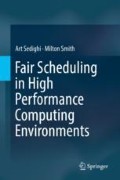Abstract
While some industries use High Performance Computing (HPC) to increase profits, other industries require HPC to do business at all. In the oil and gas industries, HPC is used to conduct seismic simulations. In the pharmaceutical industry, HPC is used to discover new drugs.
Access this chapter
Tax calculation will be finalised at checkout
Purchases are for personal use only
Notes
- 1.
(Weisbord 2004) p.81 is based on Lewin’s “Humanization of the Taylor System: An Inquiry into the Fundamental Psychology of Work and Vocation” published in 1920.
- 2.
See Sect 1.7
References
M. Armbrust, A. Fox, R. Griffith, A.D. Joseph, R. Katz, A. Konwinski, et al., A view of cloud computing. Commun. ACM. 53(4), 50–58 (2010)
K.R. Baker, D. Trietsch, Principles of sequencing and scheduling (Wiley, New Jersey, 2013)
D. Bertsimas, V.F. Farias, N. Trichakis, The price of fairness. Oper. Res. 59(1), 17–31 (2011)
B. Committee, Basel III: A global regulatory framework for more resilient banks and banking systems (Basel Committee on Banking Supervision, Basel, 2010)
A. Demirguc-Kunt, E. Detragiache, O. Merrouche, Bank capital: Lessons from the financial crisis. J. Money. Credit. Bank. 45(6), 1147–1164 (2013)
P. Glasserman, P. Heidelberger, P. Shahabuddin, Efficient monte carlo methods for value-at-risk, (2010)
S. Gleeson, International regulation of banking: Basel II, capital and risk requirements (Oxford University Press Catalogue, Oxford, 2010)
H. Hakenes, I. Schnabel, Bank size and risk-taking under Basel II. J. Bank. Financ. 35(6), 1436–1449 (2011)
M. Harchol-Balter, Performance modeling and design of computer systems: Queueing theory in action (Cambridge University Press, Cambridge, 2013)
H. Hoogeveen, Multicriteria scheduling. Eur. J. Oper. Res. 167(3), 592–623 (2005)
J. Kay, P. Lauder, A fair share scheduler. Commun. ACM. 31(1), 44–55 (1988)
S. D. Kleban, S. H. Clearwater, Fair share on high performance computing systems: What does fair really mean? Paper presented at the Cluster Computing and the Grid, 2003. Proceedings. CCGrid 2003. 3rd IEEE/ACM International Symposium on (2003)
S. Marston, Z. Li, S. Bandyopadhyay, J. Zhang, A. Ghalsasi, Cloud computing—The business perspective. Decis. Support. Syst. 51(1), 176–189 (2011)
R. G. Parker, Deterministic scheduling theory. (CRC Press, 1996)
C. Reyes, K. Walters, W. Yang, Monte carlo within a day. Paper presented at the quantitative analysis in financial markets: Collected papers of the New York university mathematical finance seminar (2001)
A. Sedighi, Y. Deng, P. Zhang, Fariness of task scheduling in high performance computing environments. Scalable Computing: Pract. Experience 15(3), 273–285 (2014). https://doi.org/10.12694/scpe.v15i3.1020
V. T’kindt, J.-C. Billaut, Multicriteria scheduling: theory, models and algorithms (Springer Science & Business Media, Berlin, Heidelberg, 2006)
D.K. Tarullo, Banking on Basel: The future of international financial regulation (Peterson Institute, Washington, D.C., 2008)
F. W. Taylor The principles of scientific management (1911)
S. Tezuka, H. Murata, S. Tanaka, S. Yumae, Monte Carlo grid for financial risk management. Futur. Gener. Comput. Syst. 21(5), 811–821 (2005)
M.R. Weisbord, Productive workplaces revisited: Dignity, meaning, and community in the 21st century (Wiley, Hoboken, 2004)
L.H. White, How did we get into this financial mess? (CATO Institue Briefing Papers, Washington, D.C., 2008)
L. H. White, Housing finance and the 2008 financial crisis. CATO Institute (2009)
Author information
Authors and Affiliations
Rights and permissions
Copyright information
© 2019 Springer Nature Switzerland AG
About this chapter
Cite this chapter
Sedighi, A., Smith, M. (2019). Introduction. In: Fair Scheduling in High Performance Computing Environments. Springer, Cham. https://doi.org/10.1007/978-3-030-14568-2_1
Download citation
DOI: https://doi.org/10.1007/978-3-030-14568-2_1
Published:
Publisher Name: Springer, Cham
Print ISBN: 978-3-030-14567-5
Online ISBN: 978-3-030-14568-2
eBook Packages: Computer ScienceComputer Science (R0)

